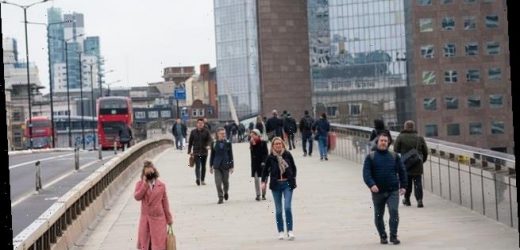Half of London firms will continue remote working when Covid pandemic ends in new blow to businesses that rely on commuter trade
- Poll found over half of London businesses will continue home-working support
- Two in five have reduced office space and three in five will keep virtual meetings
- London Chamber of Commerce conducted the survey with 500 business leaders from different industries
- Findings have drawn concern from support businesses like cafes and pubs
Half of London businesses will support some form of remote working when the coronavirus crisis ends, new research suggests.
A survey of 500 business leaders in the capital showed that one in two plans to continue offering remote working to staff, while a third expect to cut down on office space.
London Chamber of Commerce said its study revealed that almost two-thirds of employers have allowed staff to work from home at least two days a week as a result of the pandemic.
A survey of 500 business leaders by the London Chambers of Commerce showed that one in two plans to continue offering remote working to staff, while a third expect to cut down on office space
Just over half of respondents said they will continue remote working in some form each week when the pandemic is over.
And over 60 per cent of businesses said they will keep holding meetings virtually where possible.
Have you allowed staff to work from home at least 2 days a week?
36% said they have done this, and will maintain this even when the pandemic is over.
16% said they have done this, and will keep this in a reduced fashion when the pandemic is over.
10% said they have done this, but will stop once the pandemic is over.
5% said they had not done this.
32% said it was not applicable to their organisation.
1% said don’t know.
In both cases only about 5 per cent of companies contacted had not tried either allowing staff to work at home or conduct virtual meetings.
Meanwhile two in five have reduced their office space, while one in five said they had not considered this.
The business leaders were also asked when they expected conditions for their firm and the wider economy to return to pre-pandemic levels, with 41 per cent suggesting it could happen later this year, but almost half said it would take until at least 2022.
Richard Burge, chief executive of London Chamber of Commerce, said: ‘This is a further body of evidence that shows changes to ways of working that we have seen during the pandemic are going to carry on in some form for some businesses after it is over.
‘Our research shows that half of businesses will continue some remote working, whilst a third of businesses polled will continue with reduced physical space, and three in five will maintain virtual meetings where possible.’
Mr Burge suggested that such a reduction in commuters in parts of major cities could have a serious negative knock-on impact on cafes, sandwich shops and pubs used by workers throughout the day.
‘That will mean less commuters daily in certain parts of London than pre-Covid. Clearly this presents challenges for support businesses in those areas.
Richard Burge, chief executive of London Chamber of Commerce, said: ‘This is a further body of evidence that shows changes to ways of working that we have seen during the pandemic are going to carry on in some form for some businesses after it is over’
Has your company reduced physical space (e.g. offices)?
18% said they have done this, and will maintain this even when the pandemic is over.
13% said they have done this, and will keep this in a reduced fashion when the pandemic is over.
11% said they have done this, but will stop once the pandemic is over.
21% said they had not done this.
35% said it was not applicable to my organisation.
3% said don’t know.
But he added that workers remaining in their ‘home boroughs’ more often could create more opportunities outside city centres.
Mr Burge continued: ‘With a visible hybrid approach to ways of working emerging, rail companies simply must be offering part-week, flexible, season ticket options.
‘And for Transport for London there are significant implications of a potential continued reduction in daily commuter use.
‘The Government must consider a longer-term financial model with TfL that acknowledges this change of use.
‘With central London set to be quieter than pre-covid, it’s all the more essential that the right parameters are in place to support the safe return of domestic and international visitors.
‘The investment recently announced by the Mayor of London in a campaign to return domestic tourism is welcomed.
‘The UK must ensure that our COVID-19 border protection measures are effective, give consumer confidence, and ideally align with the Europe-wide scheme being proposed.
‘It’s key that the Global Travel Taskforce stick to their reporting timetable, to that regard.’
Source: Read Full Article



